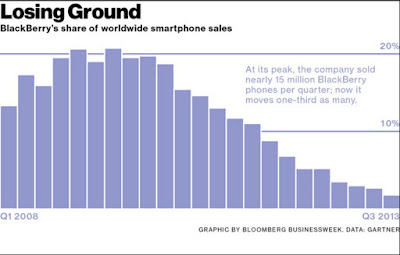CBC reported that Blackberry is exiting the hardware business. The news doesn't come as a surprise. As noted in this interview with CNBC in June of this year, the interviewer notes how Blackberry was steadily outsourcing the manufacturing of its devices. The CEO, John Chen, also confirmed that they were planning on exiting the business if it failed to be profitable:
Blackberry was my first smartphone, the 8900, to be exact.
However, when I saw the Torch, I remember thinking that after using the device how it was the perfect compromise between the touch screen and the classic keyboard. However, that feeling faded quite quickly after using the device. It was so under-powered compared to the competition and of course it lacked the apps that you could find in the Apple AppStore. But at the time I could never imagine giving up the physical QWERTY keyboard.
Since then I have moved onto Android and more specifically to the SwiftKey keyboard - to the point I can't go back to a physical keyboard!
How did BlackBerry fail to keep up with the times?
As noted in this article, Mike Lazaridis the founder of the CEO, was inspired to develop the BlackBerry when he recalled his teacher's advice while watching a presentation in 1987 - almost a decade before the Internet - on how Coke used wireless technology to manage the inventory at the vending machines. What was his teacher's advice? His teacher advised him not to get swept in the computer craze as the real boon lay in integrating wireless technology with computers.
BlackBerry caused a storm in the corporate introducing it's smartphones in 1998. It went on to dominate the corporate smartphone market as the gold standard in mobile communications. The following graphic from Bloomberg really captures the subsequent rise and fall quite well:
What happened how did the iPhone, unveiled in 2007, and the Android Operating System outflank the Blackberry?
This article in the New Yorker larger blames BlackBerry's inability to understand the trend of "consumerization of IT": users wanted to use their latest iPhone or Android device instead of the BlackBerry in the corporate environment - and was it just a matter of technology to make this happen.
Although luminaries, such as Clay Christensen, have written extensively on the challenge of innovation. And there's always the problem of hindsight bias.
However, is the problem more basic?
When we look at the financial crisis, some people like to blame poor modeling. But I think that is more convenient than accepting the reality that people got swept up in the wave.
Isn’t it fair to say that people knew that house of cards was going to come down (and some of the investment banks were even betting on it falling apart), but were overly optimistic that they would get out before everyone else does?
But that’s the point.
When we are in a situation where we are surrounded by people who confirm our understanding of the world – we may believe them instead of trying to see if our understanding of the situation is correct. With the housing bubble, the key players wanted to believe that those models were correct – even though models have failed the infamous Long Term Capital Management.
With BlackBerry, what I wonder is did they not even try to see within their families and those around them who were using the iPhone or Android devices? Weren’t they curious what “all the fuss was about”?
Although this is problem with many of us who want to believe that the present situation is going to continue indefinitely (especially when things are going our way), there are others who do stay on top of things. Most notably is the Encyclopedia Britannica that actually stopped issuing physical encyclopedias and moved to the digital channel instead.
Change is a challenge, but the key is to be prepared to admit that the current way of doing things can be done better, faster and in radically different way.
